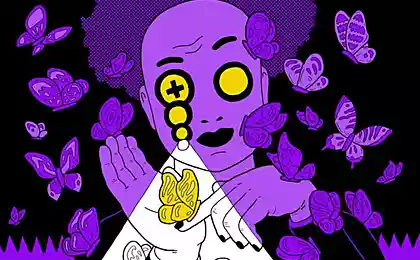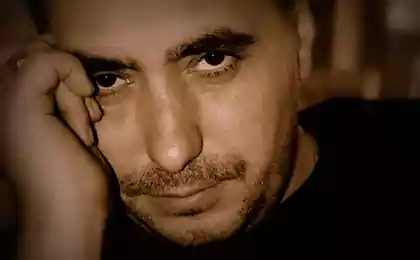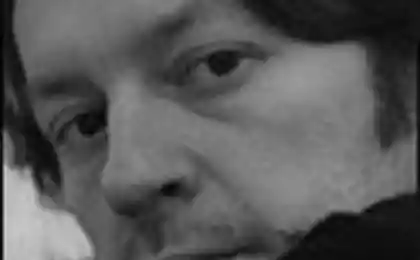559
Writing stupor: where to find the words, if not

© Isidro Ferrer
Every writer will tell you that the hardest part of his profession — not a war with publishers, not an obligation to please the tastes of the audience and not even the grueling edit their own pieces of music. The hardest part is spend hours looking at a white sheet and to recognize their inability to fill it with words.
The first to describe a writer's stupor as a special condition, was an American psychoanalyst of Austrian origin Edmund, Bergler in 1947. The follower of Freudian theory, Bergler explained the phenomenon of "writer's block" the human tendency to masochism, and need Super-ego to punish, contemptuously brushing aside the seemingly obvious conditions like a nervous overstrain or insufficient imagination.
Subsequently, the problem of psychoanalysts migrated to pedagogy. Professor, University of California Mike rose defines the creative crisis of the writer as an inability to begin or continue to write anything for reasons other than lack of basic skills or lack of involvement in the process." Thus, writing a stupor — not the prerogative of eminent writers whose Muse is a capricious and fickle creature. To fall into a stupor and the novelist and screenwriter, and blogger, and even the student who has homework an essay on the topic How I spent summer". In this regard, the issue is actively being developed in popular psychology in the US bestseller was the book Hillary Rettig "Seven secrets of the prolific: the definitive guide to overcoming procrastination, perfectionism and writer's stupor."
"There are two main vectors: first, the absence of the second is the lack of words." Not remained aloof and writers: in 2000, Stephen king released a sort of creative autobiography "How to write a book: a memoir of the craft". In it, he gave budding authors a lot of tips on how to stop fear of the unknown, a clean slate. By the way, an acute attack of writer's stupor the king experienced not Dale as last December, when I made the official Twitter and didn't know what to write in there. To hide this fact from readers (all six hours they had accumulated more than 80 thousand), the king did not, and frankly admitted: "I'm Finally on Twitter — and I can't think of what to say. I'm a good writer." Over time, however, it went, and today in the microblog king of thrillers you can find information on his food preferences, and favorite TV shows.
There are several dozen varieties of literary stupor — depending on its causes: the person may be affected by fatigue and stress, and excessive demands on himself, and even bipolar disorder. However, we can distinguish two main vectors: first, the absence of the second is the lack of words.
Sometimes, the author could not find a topic for the next book — this usually happens with writers whose debut was especially loud. When fans expect you to conquer new heights, and the detractors keep my fingers crossed in the hope that you will not reach to a given bar, it is difficult to cope with the stress and just work at your pleasure. Many "crisis second novel" pushing on a easy way, and to be safe, they refer to problems that lie on the surface and will almost certainly cause a response in the hearts of the public. Foer, for example, was not far to seek: the plot for "extremely loud & incredibly close".

It happened that with this kind of literary stupor and faced much more experienced authors. Among them — Alexander Kuprin, for whom emigration was almost turned into a complete creative collapse: settled 1920, the year in Paris, he was homesick for Russia not only as home but also as the source of subjects for short stories and journalistic articles. Accustomed to draw inspiration from Russian folklore, Russian nature, Russian way of life, Kuprin could not think of what to write in a beautiful but alien France. Therefore, his post-revolutionary work is marked by a period of stagnation, and recent works of Kuprin resonate with earlier: in particular, the essay "Svetlana" (1934) as it continues the cycle of "Listrigony", completed in 1911.
Prolific Jack London, author of over two hundred short stories, at the end of life fell into such a deep writer's block, I had to buy the idea for a book Sinclair Lewis — the then little-known novelist. Detective entitled "Office murders", London never finished — lost dashing twirled intrigue, and then, alas, died. The money received from the guru of American adventure fiction, Lewis bought a new coat. And in 1930 he received the Nobel prize — "For the powerful and expressive art of storytelling and a rare ability with satire and humor to create new types and characters". Jack London, in turn, was given this high award.
As readers Wade through a jumble of symbolic images in the prose of Virginia Woolf, and the Woolf with big labor to Wade through a veil of words, they eluded her, a waterfall fell on his head. Support English modernism, she was suffering from writer's stupor throughout life, and that is the "my own room", which, as argued by Woolf in the eponymous essay has to possess every woman, decided to pursue literature, often became for her the likeness of a prison cell.
Leo Tolstoy often experienced writer's block and in their diaries and letters scolded myself for wasting another day or writing a single intelligent line," Susceptibility of Virginia Woolf's to the creative crisis was due to chronic depression, transfered into serious mental illness: she haunted the headaches, the visions, the voices. Prone to obsession, Wolfe deliberately created a difficult working environment: it is known that she wrote while standing. According to Quentin bell, Woolf's nephew, the writer did it because he didn't want to keep up with his sister Vanessa: she was an artist and usually did not sit, but stood before the easel. Woolf believed that her own works in quality can compare to the flawless works of the sisters only if they are created in the same conditions.
Taking into account the sad story of Virginia Woolf, the conclusion that the saying "healthy body, healthy mind" is relevant in relation to the problem of literary stupor. For example, athletic, moustache and very handsome Arthur Conan Doyle was not a hostage problems, and he played a big role in this — his natural curiosity or obsession with cricket, skiing and long walks in the fresh air. On the other hand, preached a healthy way of life Leo Tolstoy is often experienced writer's block and in their diaries and letters scolded myself for wasting another day or writing a single sensible line.
One should distinguish between authors, prone to writer's block, and those for whom the painful search for the words becomes the peculiarity of the creative manner. The final volume of the novel "Madame Bovary" was only 487 pages — and Flaubert struggled with them for almost five years. Perfectionism as a character trait superimposed on favorable circumstances: the family of Flaubert, desperate to make him a successful lawyer, allowed him to work exclusively as a writer. So he had the opportunity to spend weeks working on one scene for hours to squeeze out one line.

Almost a hundred and fifty years after the publication of "Madame Bovary," Kurt Vonnegut in the book "Frameresize shared all the writers on "boxers" and "karate". First, first write the story as a whole, and then grind it, bringing to perfection. The second pattern is applied to the gradual and move on to the next sentence until the previous will not be fully satisfied. When "karate" put the last point, they do not even need to re-run the story through the eyes — he is ready and can be sent to the editor. To the writers of the first type were treated Tolstoy and Chekhov. To the writers of the second type — the already mentioned Flaubert and Vonnegut, which, in turn, has experienced a rather unusual form of creative crisis.
In the introduction to “Slaughterhouse five,” Vonnegut says, “Terribly reluctant to tell you what I had to do this damned little book — how much money, time, unrest”. And this is not coquetry: he spent nearly 25 years trying to write your important — in the eyes of posterity — the novel. During the Second world war, as an American army and being a prisoner of the Germans, Vonnegut fell under the devastating bombing of Dresden, miraculously survived it and considered it his duty to tell the world that the US air force and the UK in his eyes, he committed a monstrous, unforgivable atrocity, destroying the city, who was not even a strategically important object.
In the words of Vonnegut, on his return from the front he had enough material for a book about Dresden. He is, by and large, didn't have to fear that the American system of militarist propaganda is not to miss novel with a strong anti-war component, “Naked and the dead” Norman mailer, “from here to eternity” by James Jones and “the Adventures of Wesley Jackson by William Saroyan insurmountable obstacles no one repaired, and they made it safely to the readership. However, for a number of reasons, among which was a deep psychological trauma, Vonnegut took over the “Massacre” only in the sixties. The topic of Dresden did not go to his head — but the paper remained closed.
"Some people get hung up on the story building, the second on a detailed study of the characters, the third syntax," "the Dresden stupor" attacked Vonnegut because of the enormous burden of responsibility: writer realized that his experience is unique, and the likelihood that there is one survivor in the bombing of the American who can write a book about it, insignificant. So the demand is huge, because for the audience it becomes almost the only source of information about the tragedy. The advice that Vonnegut, teaching at the University of Iowa writing, often gave his students: “write only about what you really care for him turned into years of stagnation. Oddly enough, this did not prevent him from working on other books: before the “Massacre,” Vonnegut has published five novels and two collections of short stories.
You should also consider that writing a stupor is not identical to the creative crisis: the past does not necessarily mean sleepless nights in front of a pale flickering monitor screen. Well, before the pristine clean sheet of paper. Before burning the second volume of “Dead souls”, Gogol it anyway, wrote. For Lermontov's creative crisis turned into a complete rethinking romantic illusions — and this is reflected in frivolous “cadet poems. Life Kafka was generally solid creative crisis, coinciding with the continuing personal crisis. But, no matter what a bad opinion he had of his novels, we — through the efforts of max Brod — safely read them today.

However, psychologists proposed methods of dealing with a creative crisis and writer's block, in General, similar. They are reduced mainly to the Council for a change of scenery: a new place and new people bring new experiences. Teachers more accurate in their recommendations. Already mentioned Mike rose believes that the loss of the ability to write often arises because the writer has in mind is a stereotypical set of rules, how to work on the product. Some focus on story building, the second on a detailed study of the characters, others in the syntax.
According to rose, the author must not rely on abstract ideas about how it should be written, and thoughtfully to understand the different strategies of work on the text and choose the one that suits him. Or perhaps to find your own. Then the problem, if not disappear, then surely there will be much less, because the problem may lie not only in the absence of ideas or words, but corny in an awkward grip, the wrong shade of paper, the illiterate organized workspace or misunderstanding of their own biorhythms. Nabokov, for example, wrote on index cards, and Leonid Andreyev's the most productive time of day was the middle of the night.
Of course, the most valuable asset in the fight writer's block will be the experience of those who repeatedly experienced — and learned to cope with it. While it feels like presentation writers about how to win a creative crisis should be exclusively spiritual and Manco built around the concepts of “creativity”, “vocation” and “inspiration”. But really favorite authors are much more pragmatic than we would like to think.
"Writing a stupor — not a sentence, but only the costs of the profession" mark TWAIN argued that any activity — including literature — should be firmly systematized, breaking the global goal — the idea of the novel — on small tasks and meticulously executing them one after the other. Ernest Hemingway was advised to stop thinking about the future of the book at exactly the moment when you put the pen and go do other things: otherwise it is possible to a degree to exhaust yourself with ideas of what the next day will not have any strength to write. Norman mailer held the opposite view, saying that, if you in the evening decided that in the morning, sit down at the table, Twomey subconscious automatically sends appropriate request, and it is regardless of you, itself begins to formulate thoughts that tomorrow a torrent spilled on paper. John Steinbeck offered to imagine that you are not preparing the novel for the reader or publisher, but simply going to tell the story of someone from your loved ones — your sister or best friend.
However, the best writing on the topic of stupor voted the American screenwriter William Goldman, one of the creators of “the Stepford wives” and “Maverick”: “the easiest class on the planet — do not write.” In the end, none of the above authors, the periods of creative stagnation did not stop to leave a vast literary legacy. Writing a stupor — not a sentence, but only the costs of the profession.published
Source: theoryandpractice.ru























